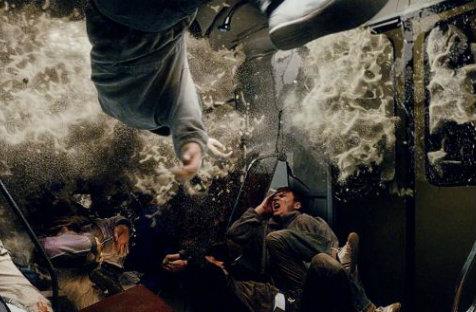Metro (Метро) has been billed as Russia’s first big-budget, Hollywood-style disaster film, and its influences show. Over the course of its 132 minutes, director Anton Megerdichev (Dark World) and writers Denis Kuryshev (Russian TV’s Poedinki) and Viktoriya Yevseyeva (Pro lyuboff) gather every twist and turn sighted in the wealth of catastrophe-driven efforts that have come before, giving each cliché, stereotypical character and outlandish turn of events its time to shine. Hearts break, as do bones; pulses rush in tandem with water; screams fray nerves and echo down train tunnels. Cinema history dictates the narrative and the outcome, with the film concerned not with originality, but with being enjoyable.
In assembling the expected, Megerdichev makes a concerted effort toward achieving this crowd-pleasing aim. Keeping with his stimulus, his approach is two-fold: relating a universal tale of triumph over adversity in the framing story of tragedy, and pondering the personal plight of the ordinary folks caught in an extraordinary situation through an emphasis on character. In the former, the damaged Moscow subway network crumbles under the weight of the Moskva River. For the latter, a selection of travellers are torn from their daily routines and thrust into the path of surging water.
A love triangle offers the film its entry point, as surgeon Andrey (Sergey Puskepalis, How I Ended This Summer), his wife Irina (Svetlana Khodchenkova, The Wolverine), and her lover Vlad (Anatoliy Belyy, August. Eighth) are caught in the midst of swirling affections. Their troubles are heightened when both men become trapped – with Andrey and Irina’s daughter Ksenia (debutant Kseniya Berezina) – in the commuter carnage, and forced to work together to ensure their survival. By virtue of their similarly stranded predicament, a group of other locals become immersed in the drama.
The abundance of obvious references roll in thick and fast, as adherence to genre remains Metro’s anchoring element. Not quite winking at its audience, but still having fun with the formula, the feature steams forward with ample energy, particularly in action-packed moments. Scenes of crashing trains and bursting riverbanks are handled with confidence, as is the interwoven heartbreak and hope. Attempts to elicit tension may be much less effective given the evident conclusion, but prove competent in their predictable construction.
Alas, even the noblest of intentions can come close to wearing out their welcome when all that eventuates is endless repetition. Playing ‘pick the US counterpart’ becomes tiresome, especially when surrounded by a fading second half and paint-by-numbers performances. The chasm between the film’s successes and failures may again mirror its many average sources of inspiration, but remains less credible in such a blatant copy. Though Metro’s aims in creating Russian film history are to be admired, its execution leaves much to be desired.
Rating: 2 ½ stars out of 5
Metro (Метро)
Director: Anton Megerdichev
Russia, 2013, 132 mins
Russian Resurrection Film Festival
http://russianresurrection.com/2013
Melbourne: 3 – 16 July
Canberra: 16 – 21 July
Sydney: 24 July – 7 August
Brisbane: 26 July – 4 August
Perth: 1 – 11 August
Byron Bay: 2 – 4 August
Actors:
Director:
Format:
Country:
Release:





